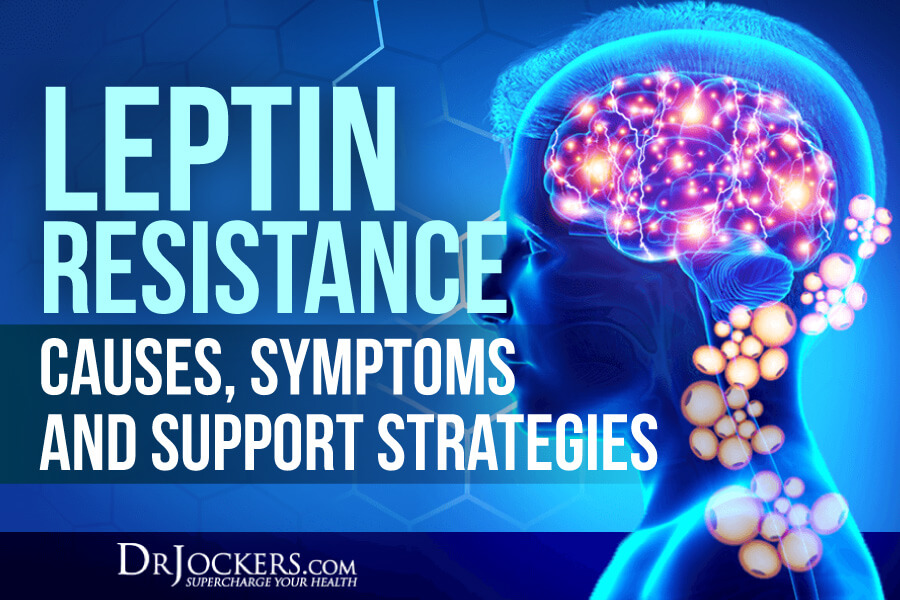 Leptin Resistance: Causes, Symptoms and Support Strategies
Leptin Resistance: Causes, Symptoms and Support Strategies
Do you have trouble losing weight? Do you find that after an initial weight loss from a diet, you quickly gain the weight back? Are you stuck in a cycle of yo-yo dieting? Do you have cravings and feel hungry even after meals? You may have leptin resistance.
Leptin is a hormone that signals your brain if you need more food for energy or if you have enough fat stored. The problem is that if you have leptin resistance, your brain is unable to recognize leptin signals which drives cravings, unhealthy eating habits, and weight gain.
In this article, I will explain what leptin is. You will learn how leptin resistance works and develops and what symptoms you may experience with leptin resistance. You will understand the main causes of leptin resistance. I will share my top natural support strategies for leptin sensitivity to help improve your health.
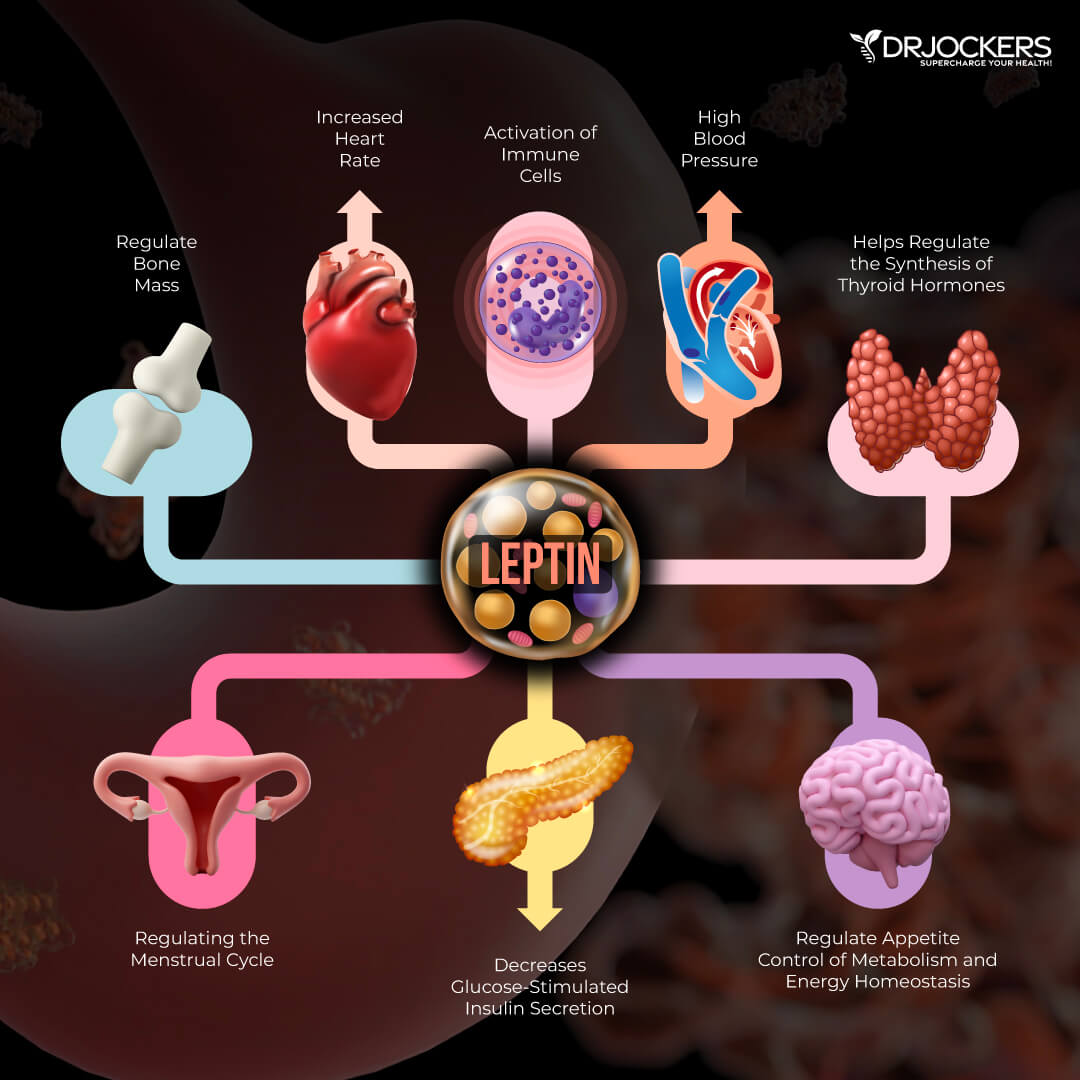
What Is Leptin
Leptin is a hormone produced by fat cells found in adipose tissues. Research has shown that the more fat you have on your body, the more leptin your body produces. Leptin travels through the bloodstream to your brain to send signals to your hypothalamus. Part of its job is to help your brain decide how much to eat and control your food intake.
Your fat cells create leptin to signal your brain how much fat they carry. If you have enough or more than enough fat cells, high levels of leptin will signal that. If you have low levels of fat, low levels of leptin will signal that you may need to eat more. If you have more fat and higher leptin levels, your body will know that you need to eat less and burn more to stay in a healthy range.
This system uses a negative feedback loop similar to your breathing, blood pressure, and body temperature allowing your body to stay at a balanced and healthy state. According to a 2003 study on the role of leptin in regulating neuroendocrine and metabolic function during a 72-hour acute fast, understanding leptin function can play an important role in the understanding and treatment of obesity and eating disorders (1, 2, 3).
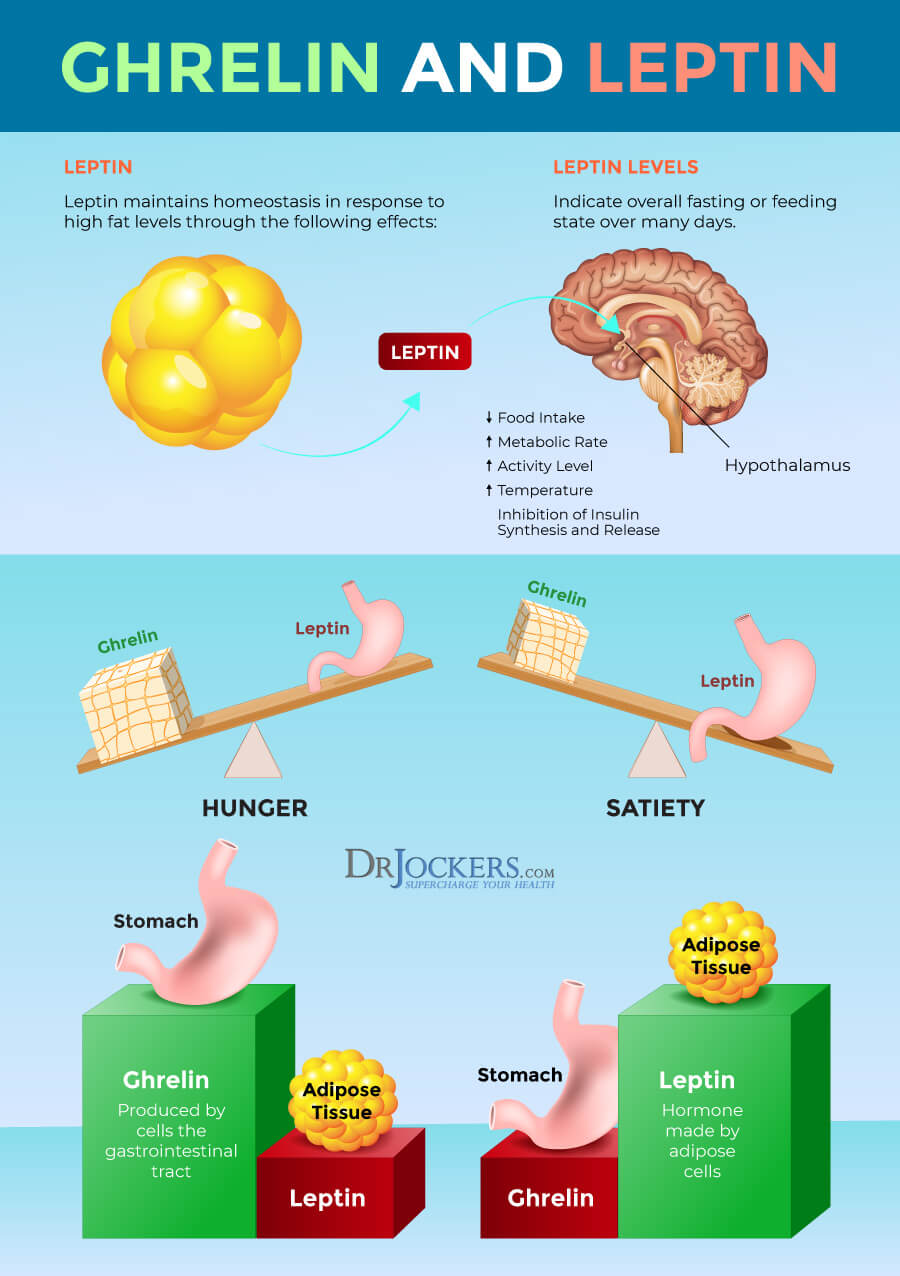
How Does Leptin Resistance Develop?
If you are overweight or obese, your body is carrying a lot of fat cells, which means that you also have high levels of leptin. Under normal circumstances, high leptin levels should urge your body to naturally limit your food intake by letting your brain know that you have plenty of stores of energy and fat to survive.
However, if you have leptin resistance, this leptin signaling does not work properly. You may have plenty of fat and plenty of leptin, if you have leptin resistance, your brain is unable to see and recognize it.
According to a 2013 study on the molecular mechanisms of central leptin resistance, leptin resistance is an important biological contributor to obesity, which should not be overlooked. Despite having high levels of leptin, your brain cannot see this and doesn’t receive the leptin signal. As a result, it will believe that you don’t have enough energy stored and are actually starving (4, 5, 6, 7, 8, 9).
Research on leptin’s role in obesity and energy balance demonstrated that this miscommunication would make your brain choose behavior patterns to regain body fat that it thinks it’s missing. As a result, your brain will prompt you to eat more to prevent starvation and reduce energy expenditure to conserve energy.
Leptin resistance may also be one of the reasons why many diets fail and why some people struggle to lose weight. As you lose weight, your body loses fat mass, however, it may not reverse leptin resistance.
Your brain may buckle down, increase your hunger and appetite, and decrease energy expenditure even more so to make up for the lost fat leading to yo-yo dieting. Leptin resistance often goes hand in hand with insulin resistance as well and may play an important role in the prevention and treatment of prediabetes and diabetes (7, 8, 9, 10, 11, 12, 13).
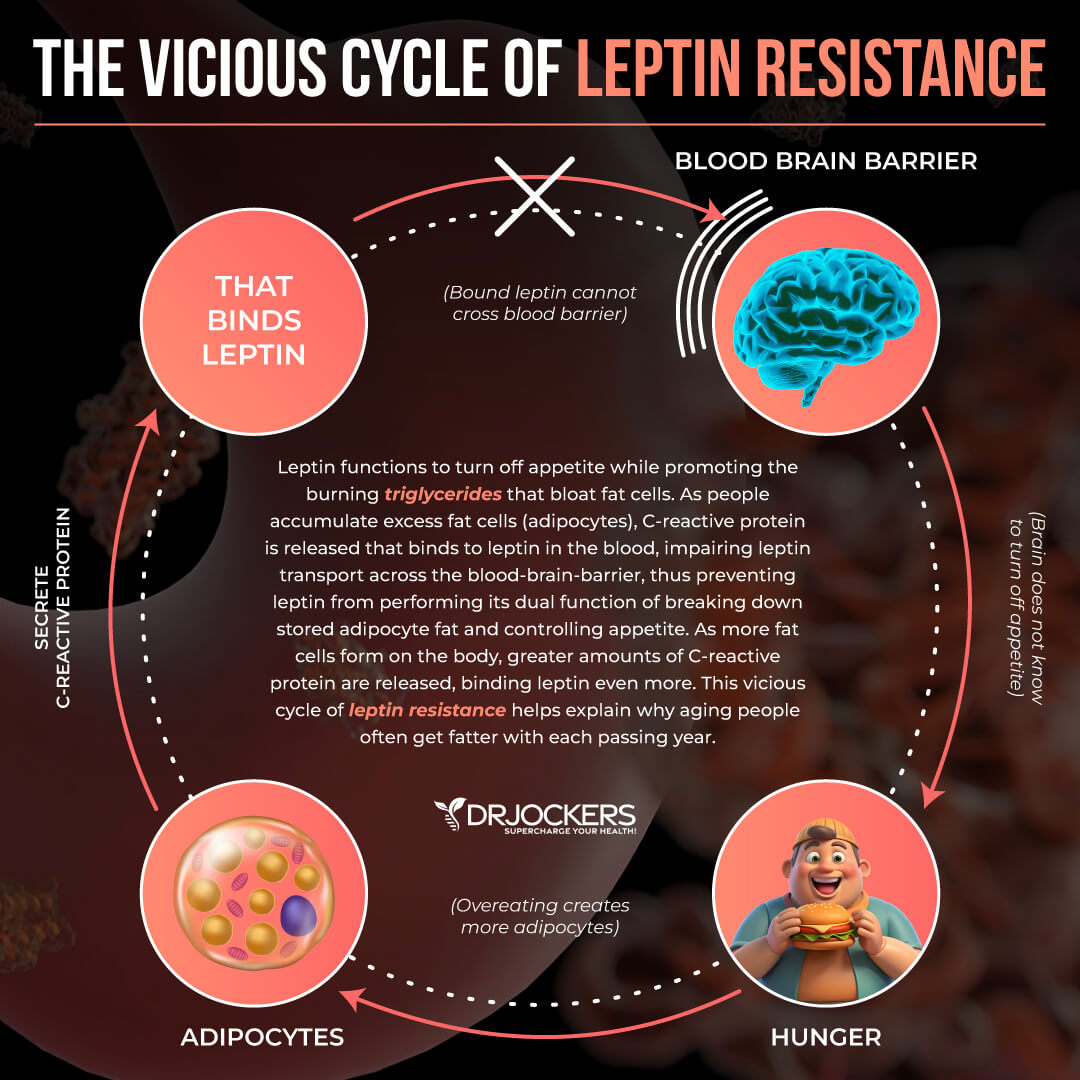
Symptoms of Leptin Resistance
Leptin resistance has a variety of symptoms, including:
- Cravings, especially sugar and carb cravings
- Hunger even after meals.
- Weight gain
- Trouble losing weight or quickly gaining back lost weight.
- Belly fat.
- Poor energy levels
- Blood sugar imbalances
- High triglycerides
- High blood pressure
- Feeling stressed out often
If you suspect that you have leptin resistance, you can work with a functional health practitioner, like me, to find out for sure. Optimal fasting leptin levels are between 4 and 6 ng/L. While this is a simple lab test, conventional medical doctors don’t test for it since there is no medication to treat leptin resistance.
By understanding your symptoms and with the help of this blood test, other blood, and lab work to check for other imbalances and underlying issues, we can create a personalized treatment plan to regain your health naturally. After reviewing the main causes of leptin resistance, I will share my top support strategies naturally to help you get started improving your health today.
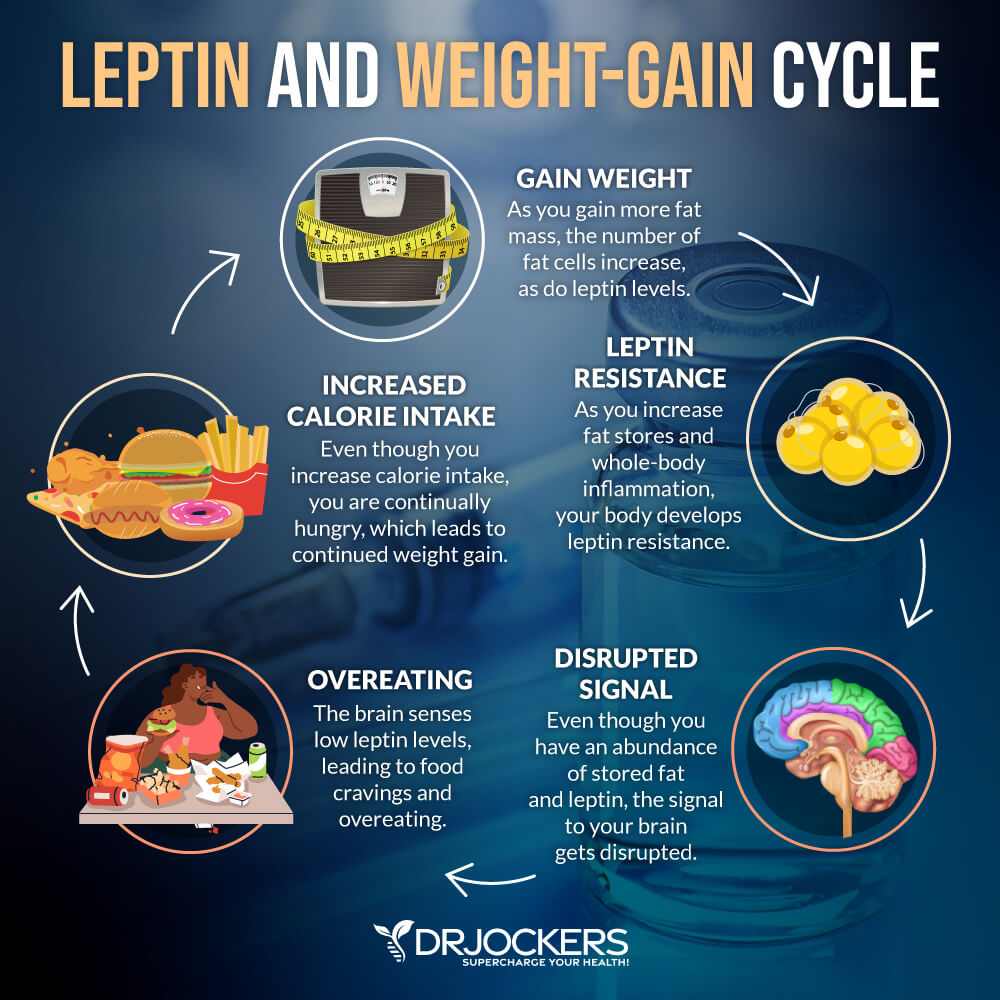
Main Causes of Leptin Resistance
Leptin resistance is a serious issue that impacts millions of people around the world. Most people are not familiar with this condition and what the root causes of it are.
The main causes of leptin resistance are related to an array of lifestyle, dietary, environmental, and health factors as listed in the image below. Let’s look at them one by one.
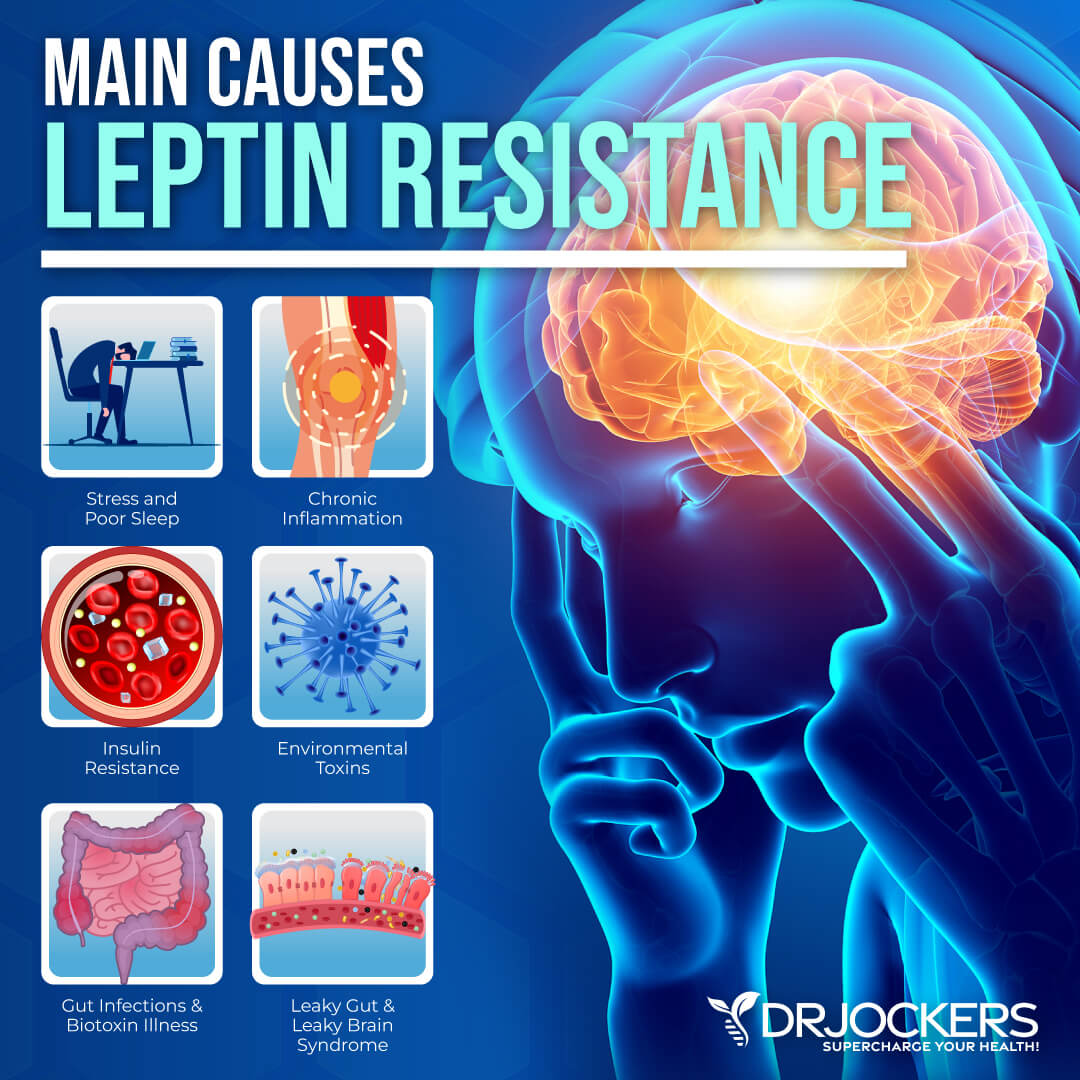
Stress and Poor Sleep
Chronic stress and poor sleep are two lifestyle factors that can negatively influence your health in many ways. They are also part of a vicious cycle.
Chronic stress can contribute to poor sleep while poor sleep can increase stress. When you are under stress, your body produces cortisol, a stress hormone. Leptin resistance leads to increased stress response and increased cortisol production.
The problem is that cortisol contributes to more fat production and may further feed the cycle of leptin resistance, obesity, and metabolic syndrome. As a 2013 and 2016 study demonstrated, chronic stress may lead to leptin resistance and insulin resistance, and increased intake of comfort foods keeps you in this cycle of leptin resistance and weight issues. You can learn more about the effects of poor sleep by reading this article (13, 14).
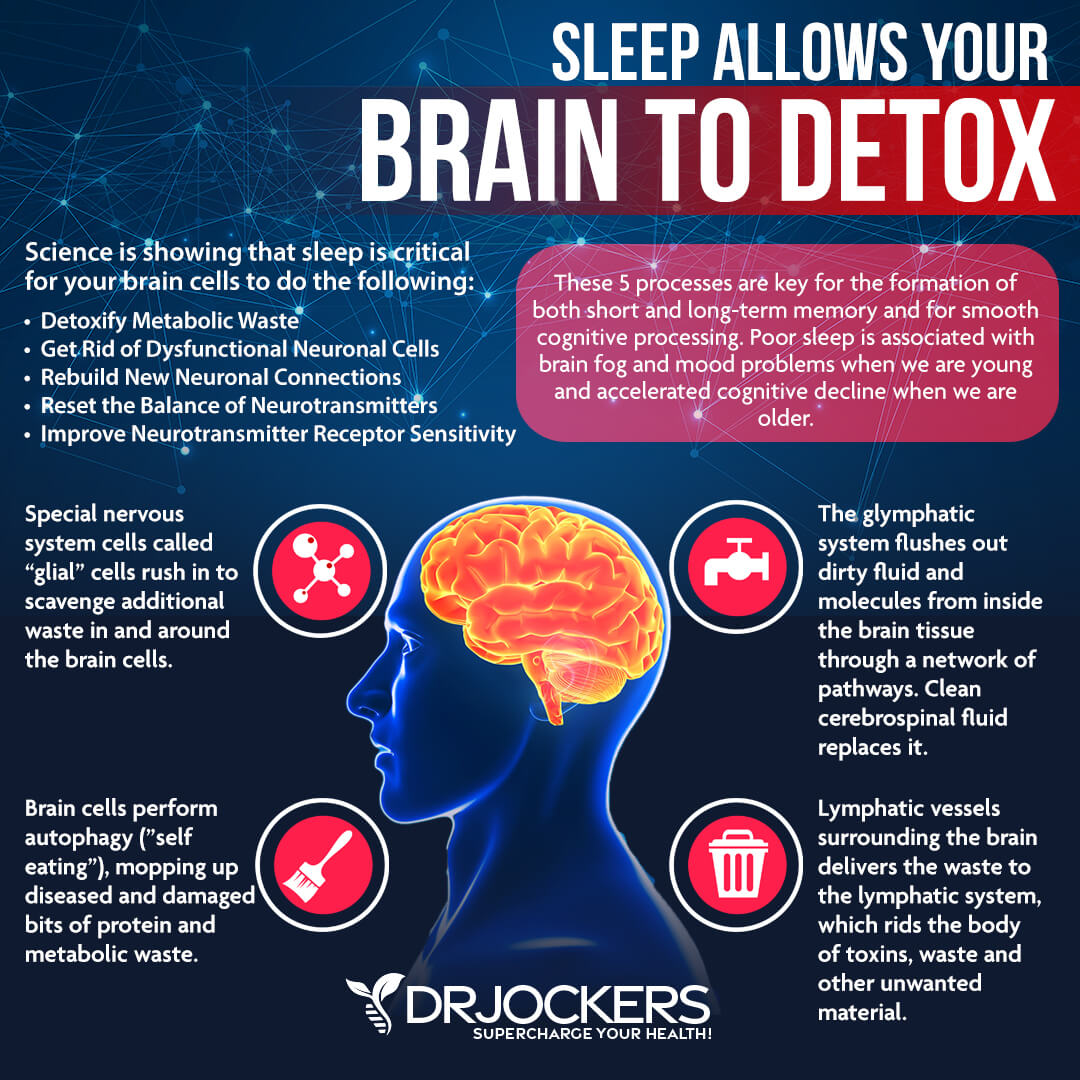
Chronic Inflammation
Chronic inflammation is one of the main underlying causes of most of our modern-day health problems. Chronic inflammation may develop due to poor dietary choices eating an inflammatory diet high in sugar, refined oil, artificial ingredients, and processed food, chronic stress, lack of exercise, poor sleep, environmental toxicity, infections, and more. It turns out that inflammatory signaling in your hypothalamus is one of the main underlying causes of leptin resistance as well.
According to a 2010 scientific review, leptin is an important link between immune homeostasis and inflammation and leptin can lead to a pro-inflammatory response and inflammation in the body. This can increase your risk of other health issues as well.
A 2008 study has found that leptin and inflammatory markers in obesity-induced leptin-resistance may help to determine the risk factors for cardiovascular health issues. You can learn more about chronic inflammation by reading this article (16, 17).
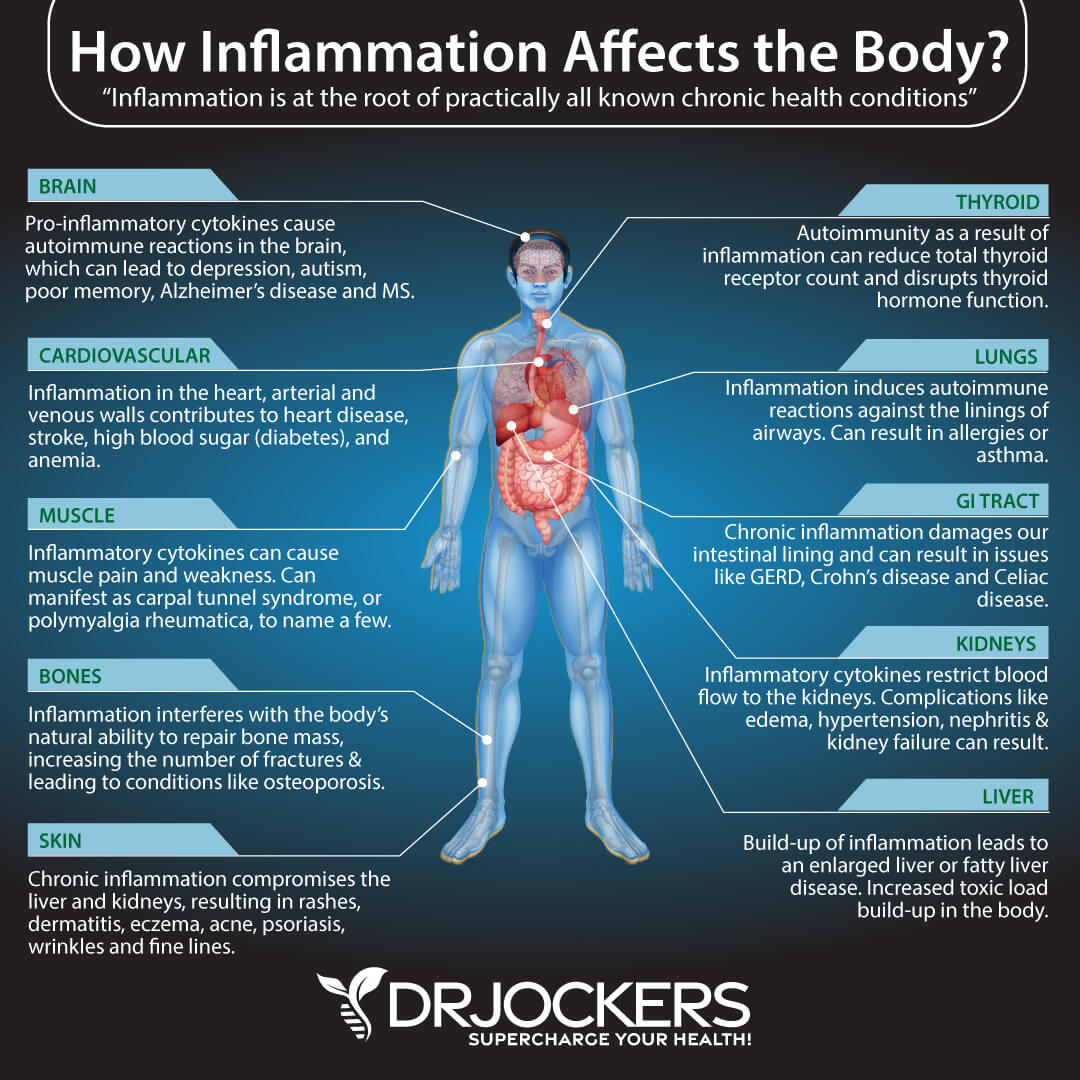
Insulin Resistance
Leptin and insulin resistance go hand in hand, so if you are experiencing one, it is important to check for the other and address both issues during treatment. Insulin resistance increases insulin in the blood which causes the brain difficulties in estimating your leptin levels.
Increased leptin resistance can lead to food cravings, weight gain, hunger after meals, and poor energy, which are all symptoms that people with insulin resistance, prediabetes, and diabetes are also familiar with.
These symptoms can also lead to high blood sugar levels further feeding the cycle of insulin resistance, leptin resistance, and related health issues. A 2013 review suggests that addressing leptin resistance may also help to improve insulin sensitivity and improve symptoms of prediabetes and diabetes. You can learn more about insulin resistance by reading this article (18).
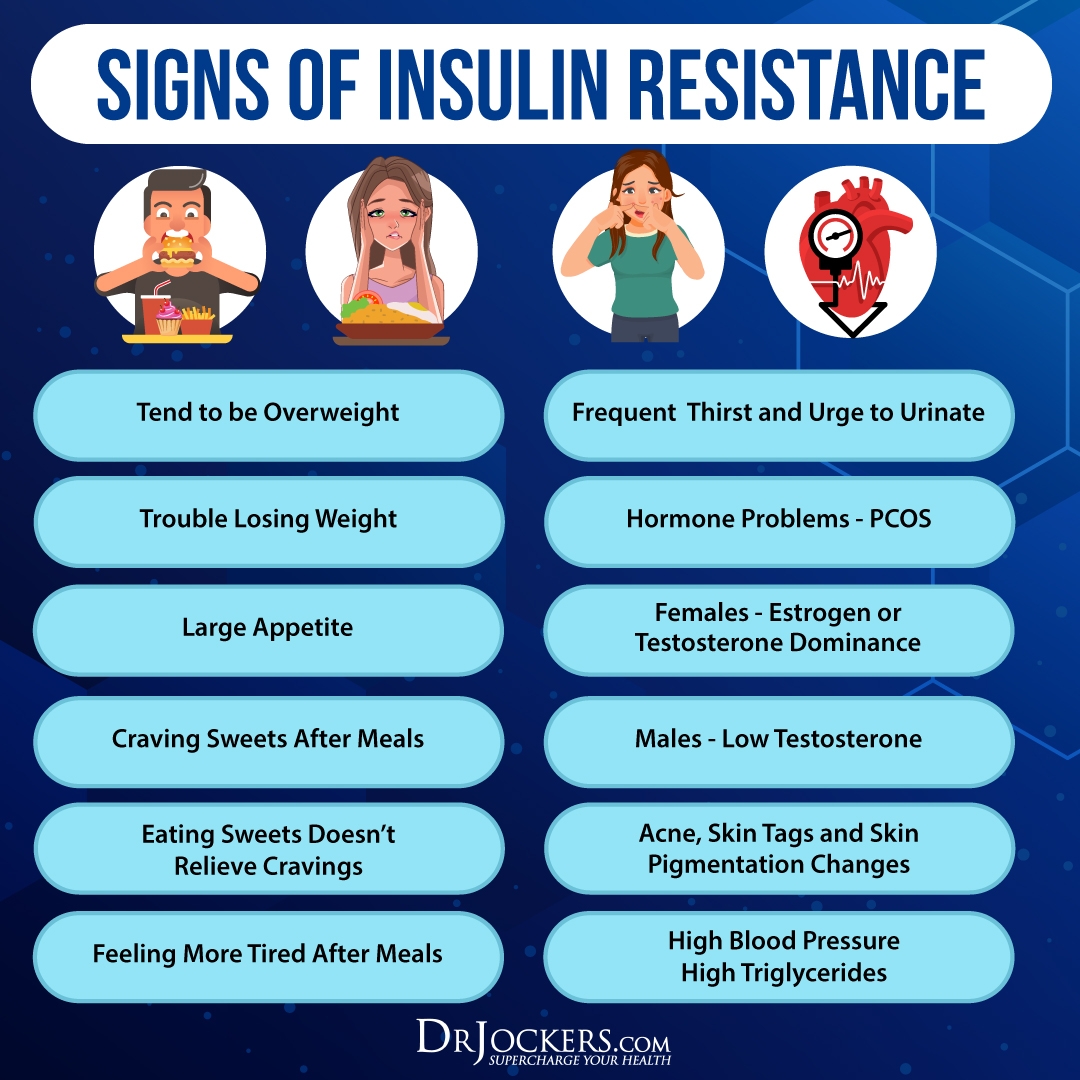
Environmental Toxins
Environmental toxicity is an enormous health risk yet it’s nearly impossible to completely escape it. Toxins are everywhere. Our polluted air, tap water, indoor air, conventional cleaning, body, and beauty products, cigarette smoke, plastics, herbicides, and pesticides are just some examples of environmental toxins that you have to pay attention to.
Environmental toxins can increase your risk of chronic inflammation and chronic health issues. Environmental factors are also one of the hidden issues behind our obesity epidemic. A 2010 research discussed that exposure to environmental chemicals can increase the risk of obesity, insulin resistance, metabolic issues, and obesity-related cardiovascular issues. As you’ve learned already, these issues go hand in hand with leptin resistance (19).
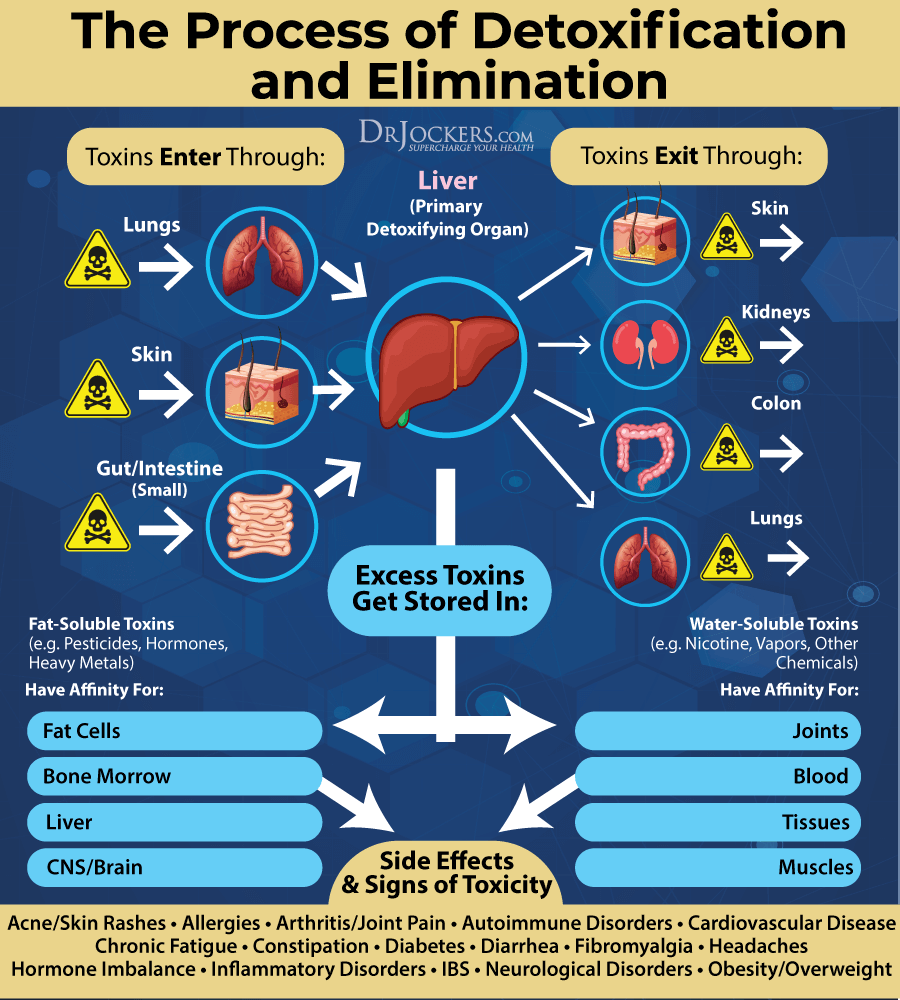
Gut Infections and Biotoxin Illness
Gut infections and biotoxin illness, such as mold illness and Lyme’s disease can increase your risk of chronic inflammation, chronic pain, chronic health symptoms, and chronic disease. 2018 research discussed that leptin resistance is associated with dysregulation of cytokine production making you more vulnerable to infections, increased inflammatory response, autoimmune conditions, and malnutrition (20).
A 2016 study is just one of the many studies that found that the gut microbiota plays a major role in and can increase the risk of obesity. Gut infections and biotoxin illness can negatively affect your healthy microbiome and as a result, increase your risk of obesity, leptin resistance, and related health issues. You can learn more about biotoxin illness by reading this article (21).
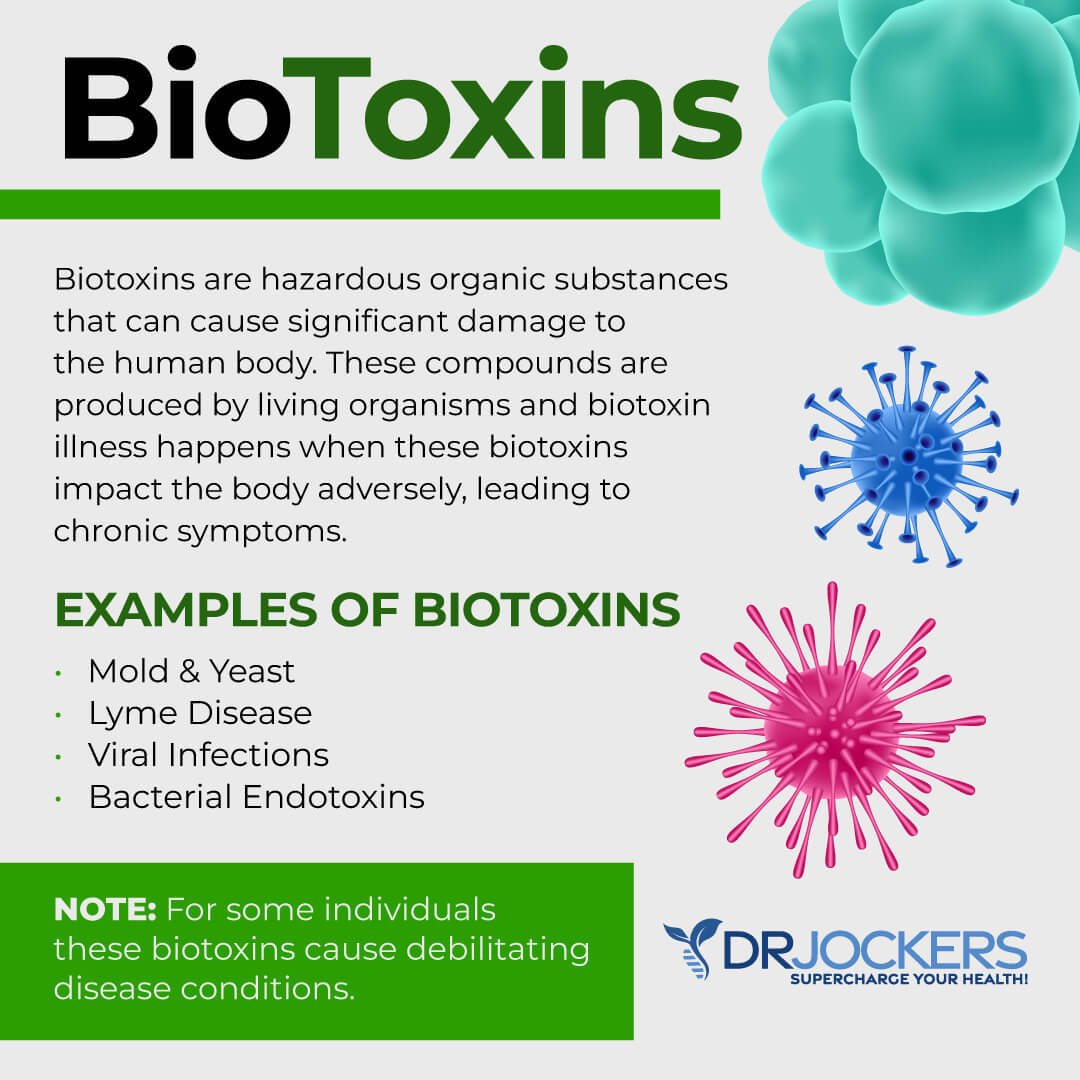
Leaky Gut & Leaky Brain Syndrome
As a result of unhealthy dietary and lifestyle choices, environmental toxicity, stress, and gut flora imbalance, your gut can become permeable or leaky. Leaky gut syndrome means that food particles and toxins can pass through your gut lining, get into your bloodstream, stimulate your immune system, increase inflammation, and increase your risk of disease.
A similar situation can happen to your brain as well due to similar factors. Your blood-brain barrier (BBB) is a protective layer that keeps your brain a sanctuary that keeps bacteria, viruses, and other toxins away. However, unhealthy dietary, lifestyle and environmental factors can cause the interruption and destruction of the blood-brain barrier.
According to a 2004 research, leptin plays an important role in intestinal inflammation. As you’ve already learned, unhealthy gut flora can increase chronic inflammation, lead to metabolic problems, cause weight gain and obesity, and contribute to leptin resistance feeding the cycle. As you know, the role of leptin is to communicate with your brain, and leptin resistance happens because of miscommunication and your brain’s inability to recognize leptin signaling.
A 2019 study has shown that impaired leptin transport across the BBB is one of the underlying causes of leptin resistance. It seems like leaky gut syndrome and leaky brain syndrome may both play a role in the development of leptin resistance. You can learn more about leaky gut syndrome by reading this article and leaky brain syndrome from this article (22, 23).

Natural Strategies to Support Leptin Sensitivity
The good news is that if you are dealing with leptin resistance, you can improve your health by making a few simple changes in your life. Here are my top natural strategies to support insulin resistance.
Anti-Inflammatory Nutrition Plan
One of the best ways to lower chronic inflammation and support your body is by following an anti-inflammatory nutrition plan. Remove inflammatory foods, including refined sugar, refined oils, artificial ingredients, deep-fried and junk foods, sodas, sugary drinks, and processed foods (16, 17).
Eat an anti-inflammatory, nutrient-dense diet rich in greens, vegetables, herbs, spices, low glycemic index fruits, healthy fats, and clean animal protein. You may support this anti-inflammatory nutrition diet and further support your health by employing principles of the ketogenic diet and practicing intermittent fasting. I will address the benefits of ketosis and intermittent fasting in the next two sections. To learn more about the anti-inflammatory ketogenic diet I recommend, reading this article.
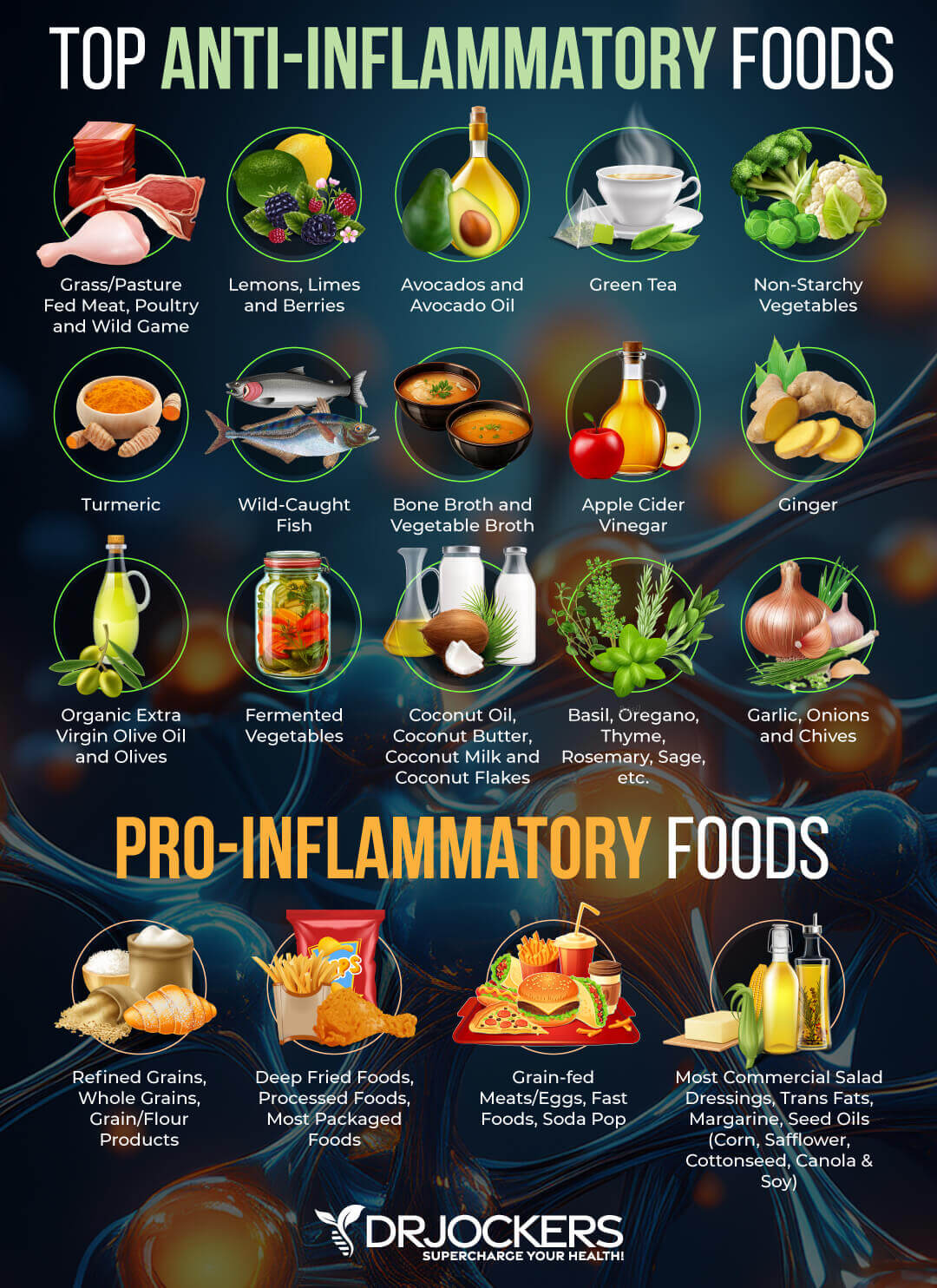
Get Into Ketosis
In our modern-day diet, most people eat high or moderate in carbs. As a result, most people’s bodies rely on dietary glucose from these foods for energy. However, if you are following a high-fat diet or fasting, your body doesn’t receive enough glucose and has to turn to dietary and stored fat for energy.
These fats get turned into ketones and turn into energy. Ketosis can help you lose body fat, reduce inflammation, increase autophagy, improve insulin sensitivity, improve mitochondrial biogenesis, and improve your overall health (24, 25).
One of the best ways to get into ketosis is by practicing a low-fat ketogenic diet. Focus on healthy fats, such as avocados, coconut oil, organic butter and ghee, clean animal protein, such as pasture-raised beef, grass-fed poultry and eggs, wild boar, and wild-caught fish, as well as lots of greens, vegetables, herbs, spices, fermented foods, and some nuts, seeds, and low glycemic index fruits.
Make sure to keep your carbohydrate intake low at around 5 to 10 percent. Additionally, practicing intermittent fasting can help you get into ketosis. To learn more about the benefits of ketosis, I recommend this article.
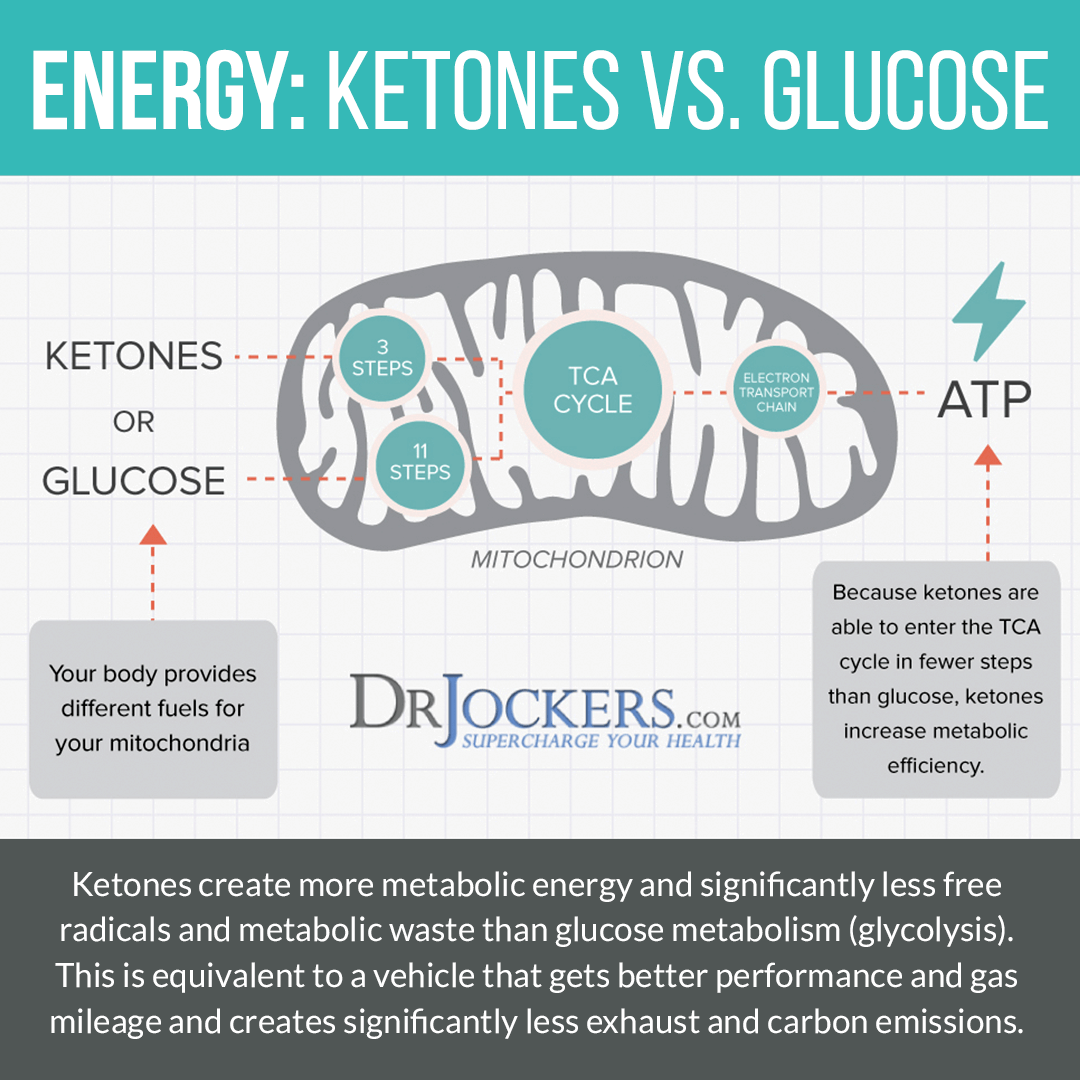
Intermittent Fasting
Intermittent fasting is a form of eating that cycles between not eating (fasting) and eating (feasting) over a certain period, usually a day. Intermittent fasting goes hand in hand with the ketogenic diet. They share similar benefits, including improved insulin sensitivity, lower inflammation, increased autophagy, better immune regulation, and decreased risk of chronic disease (26, 27, 28, 29, 30, 31, 32, 33, 34).
I recommend that beginners start with 12 hours of fasting a day, including overnight sleep, and then slowly increase the fasting window. Most people feel their best with the 16:8 approach of 16 hours of fasting and 8 hours reserved for your meals.
However, it’s important that you stay in close communication with your body, watch your symptoms, and figure out what works best for your body. To learn more about the benefits of intermittent fasting and best intermittent fasting practices, I recommend this article.
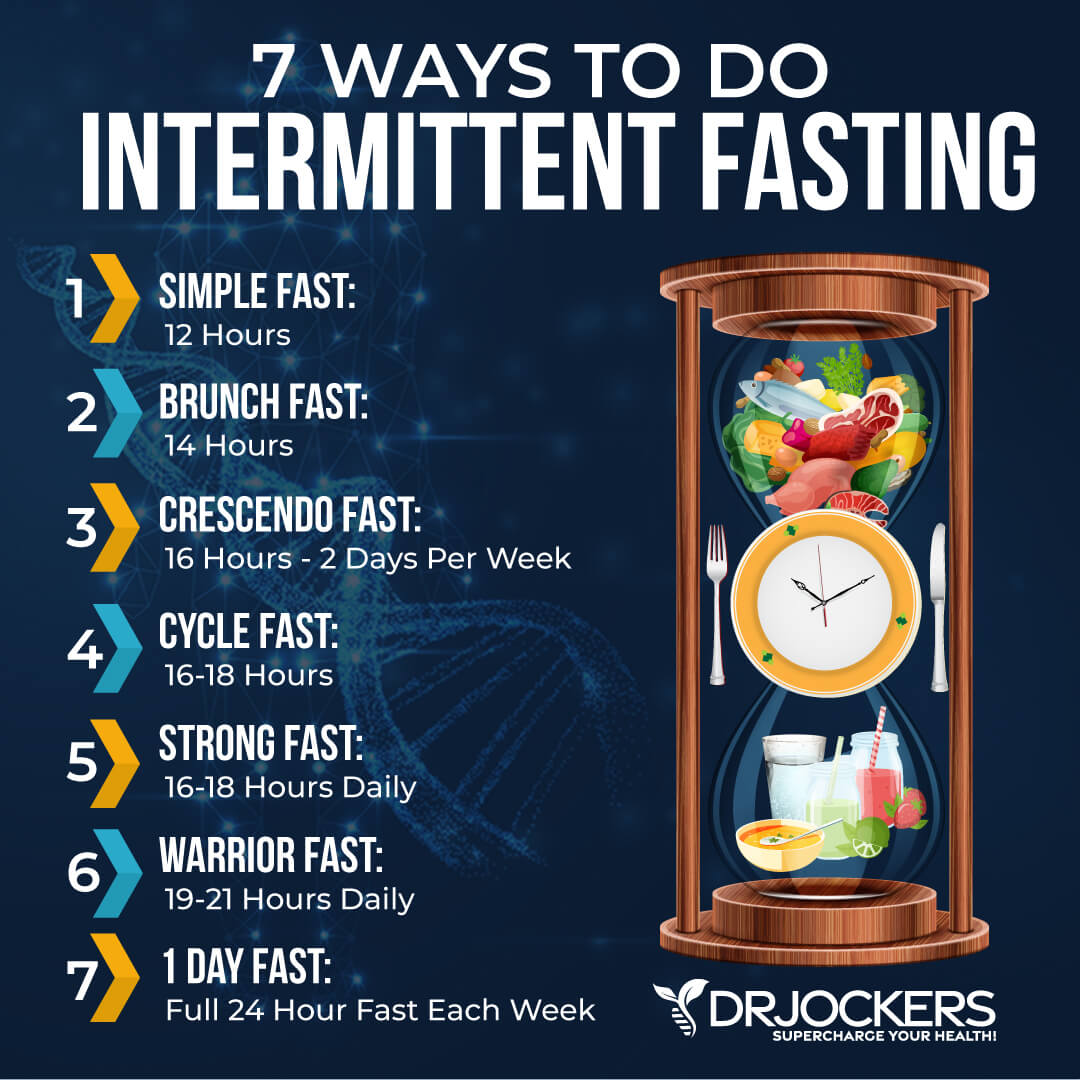
Improve Sleep Quality
Improving your sleep is important for your overall health. Research studies from 2004 and 2015 have shown that poor sleep is associated with poor leptin levels. Improved sleep, however, may increase leptin sensitivity, lower inflammation, benefit weight loss, and improve your overall health (35, 36).
I recommend that you get 7 to 9 hours of quality sleep at night. Avoid food, sugar, caffeine, stress, and electronics close to bedtime, and develop a calming bedtime routine that helps you wind down and relax. Reading, journaling, taking a healing bath, meditation, practicing gratitude, prayer, and stretching are all great ideas that relax your body and calm your mind.
Make sure to support your natural sleep rhythms by having a regular bedtime and waking up around the same time each day. To improve your sleep, you may try using a sleep tracking technology. You can learn more about sleep tracking by reading this article.

Reduce Stress Levels
As you’ve learned earlier, chronic stress is a major contributing factor to leptin resistance, obesity, inflammation, and other health issues. Reducing your stress levels is critical for improved leptin sensitivity and better health (13, 14).
Avoid situations and people that stress you out as much as possible. Since removing these situations and interactions completely is impossible, it is important that you learn to respond to stress better and practice stress-reducing strategies.
Surround yourself with loving and uplifting people and make sure to reserve some ‘me-time’. Practice gratitude, prayer, meditation, breathwork, QiGong, Tai Chi, stretching, grounding, and other stress-reducing strategies. Move your body and spend time in nature.
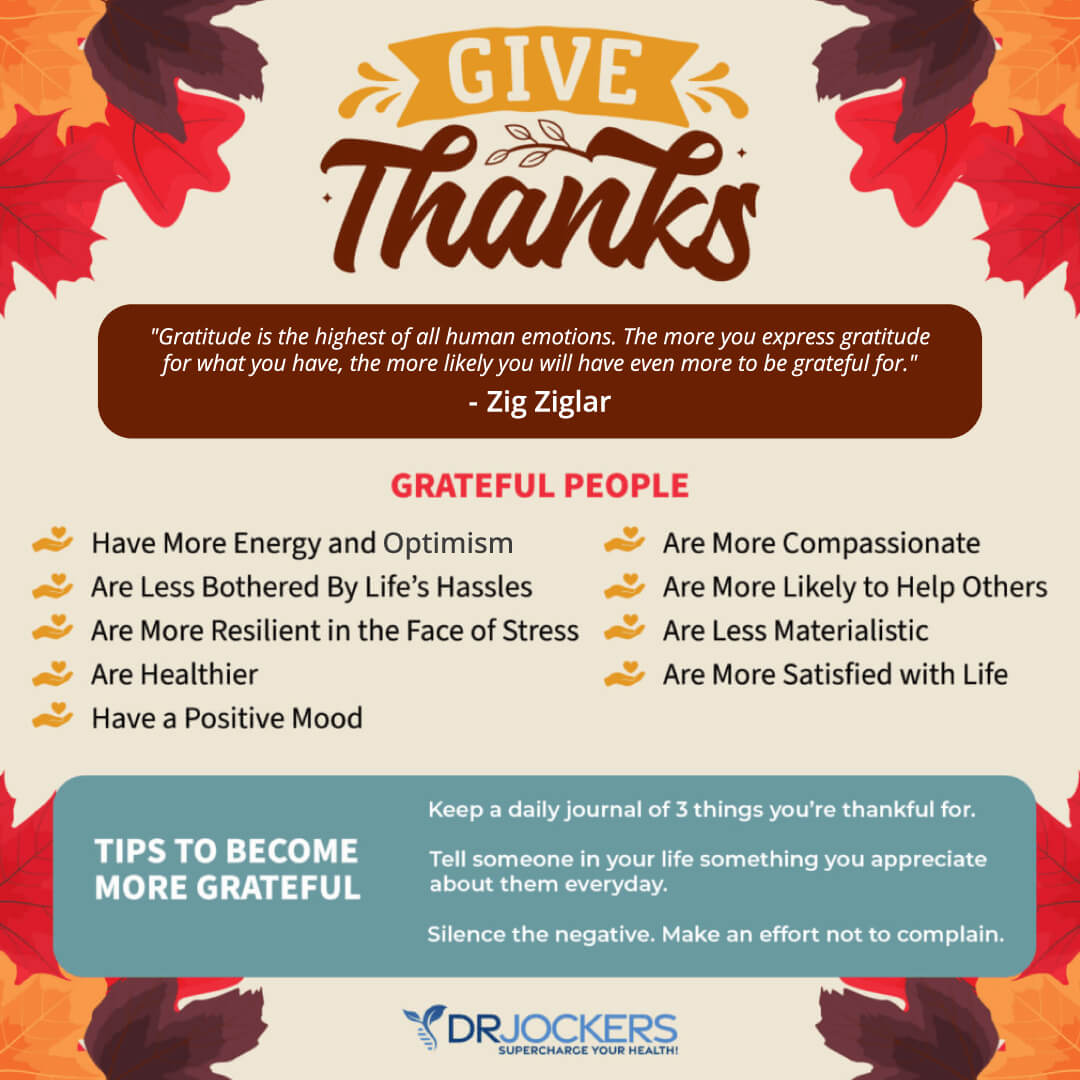
Sun Exposure
Sun exposure triggers vitamin D production in your body. Vitamin D is critical for reducing inflammation, healthy immunity, relaxation, better brain function, metabolic function, bone mineralization, and overall health.
I recommend that you get regular sun exposure. To avoid harm from ultraviolet radiation, make sure to avoid the sun mid-day when it’s the strongest and protect yourself from sunburn.
While practicing safety measures, make sure to get your outdoor time in soaking in the sunshine by taking nature walks, walking your dog, playing with your kids, grounding, or exercising outdoors. Even when the colder and darker months hit, it is important that you spend at least 15 minutes outside when the sun is out (37).
Besides sun exposure, outdoor time is a great opportunity to breathe in some fresh air, connect with nature, and move your body, which are all important for reducing inflammation, lowering stress, supporting leptin sensitivity, and improving your health. Along with sun exposure, I recommend daily vitamin D3 supplementation and eating foods that are rich in vitamin D, including mackerel, salmon, tuna, cod liver, tilapia, and other fish.

Movement & Exercise
Moving your body is important for your health and well-being. According to a 2006 study, exercise can have inhibitory effects on your leptin levels. Acute physical training may help to lower circulatory leptin levels and help to regulate energy balance and metabolism supporting weight loss. Exercise and physical movement also help to lower inflammation, decrease stress, support fat loss, and improve overall health (38).
I recommend that you exercise at least 20 to 30 minutes a day five days a week combining cardio, strength, and resistance training. High-intensity interval training (HIIT) and Tabata workouts are a great way to combine all three within a short workout. Other great ideas for cardio include hiking, swimming, biking, dancing, rebounding, jogging, and aerobics classes.
Great examples of strength and resistance training include bodyweight workouts, weightlifting, CrossFit, and kettlebell training. Low-intensity workouts that also strengthen and support your body include Pilates, Barre workouts, and stretching exercises.
Additionally to working out, it is important that you generally stay active throughout the day by taking walks in the morning, at lunch, or in the evening, taking the stairs when possible, biking or walking instead of driving if you can, playing with your kids or pets, dancing to your favorite songs, getting up to stretch regularly, doing yoga moves throughout the day, gardening, doing housework or home improvement projects, and using a standing desk.
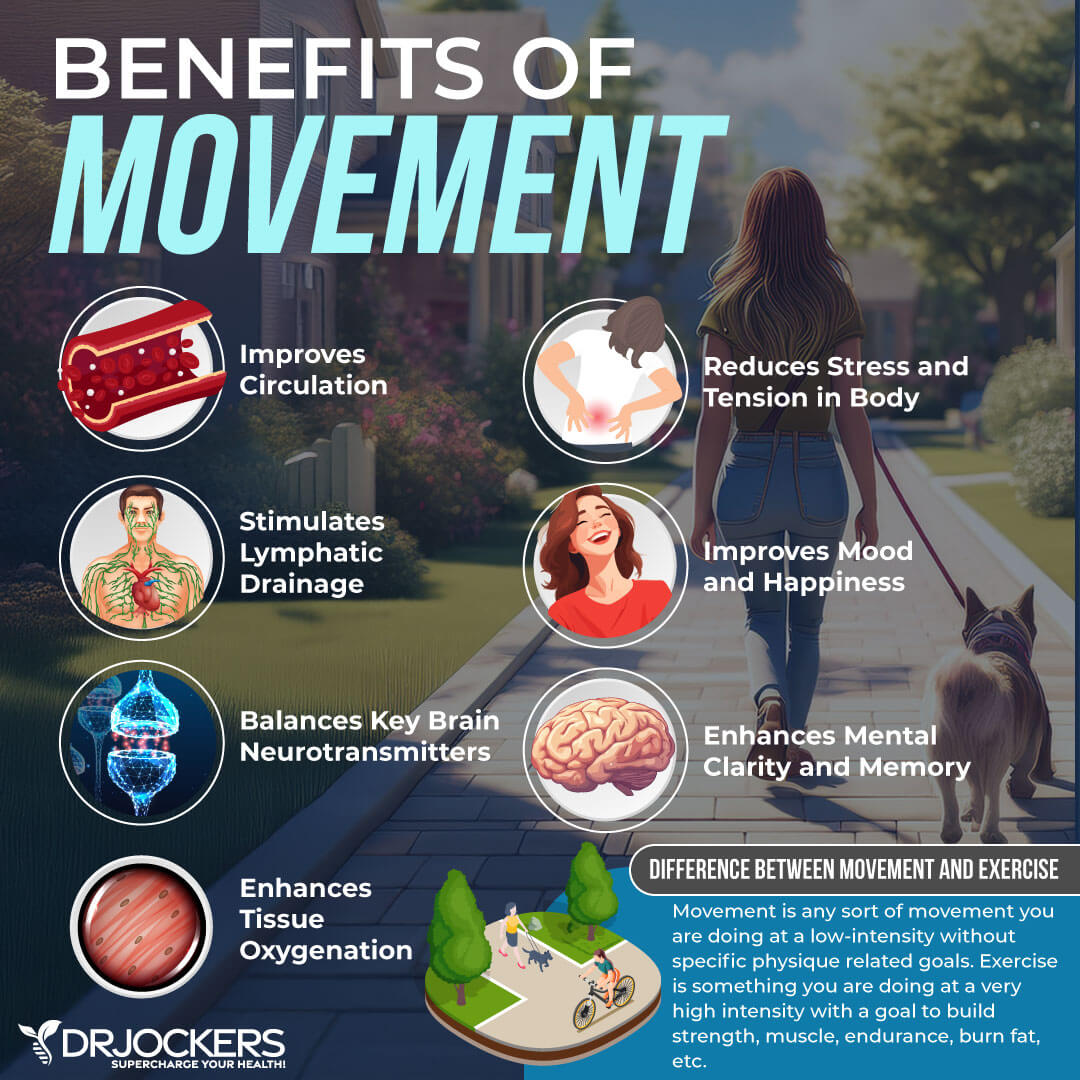
Reduce Toxin Exposure
To improve leptin sensitivity, it is important that you reduce toxin exposure. To improve your indoor air quality, I recommend that you use a high-quality air-filtration system. I personally use and highly recommend Air Doctor for air-purification. Have plenty of natural plants in your home to increase fresh oxygen around you. If you are a smoker, stop smoking or vaping. Avoid second-hand smoke as much as possible (19).
Make sure to drink purified, filtered water and avoid tap or bottled water. Stop using plastic and opt for glass jars, glass or aluminum bottles, ceramic mugs, glass, ceramic, wooden, and bamboo kitchenware, cloth bags, and other non-plastic options.
Remove chemical-filled conventional cleaning, body, and beauty products, and use organic, natural, and homemade alternatives. Eat organic food whenever possible. Read labels and avoid chemicals, plastic, and unnatural ingredients.

Improve Detoxification Pathways
Throughout our lives, we are exposed to an enormous amount of toxins. Even if you have already changed your diet, removed toxic conventional products, and transformed your home into a non-toxic environment, you have many years under your belt being exposed to toxins, including pesticides and herbicides from non-organic foods, mold, air toxicity, allergens, infections, plastics, and chemicals. Improving your detoxification pathways is key to improved health and better leptin sensitivity (19).
To support your detoxification pathways, drink plenty of clean water to support detoxification through sweating and urine. Try infrared saunas to help detoxify through sweating. Rebounding and dry-skin brushing are also fantastic strategies that support your lymphatic pathways and detoxification.
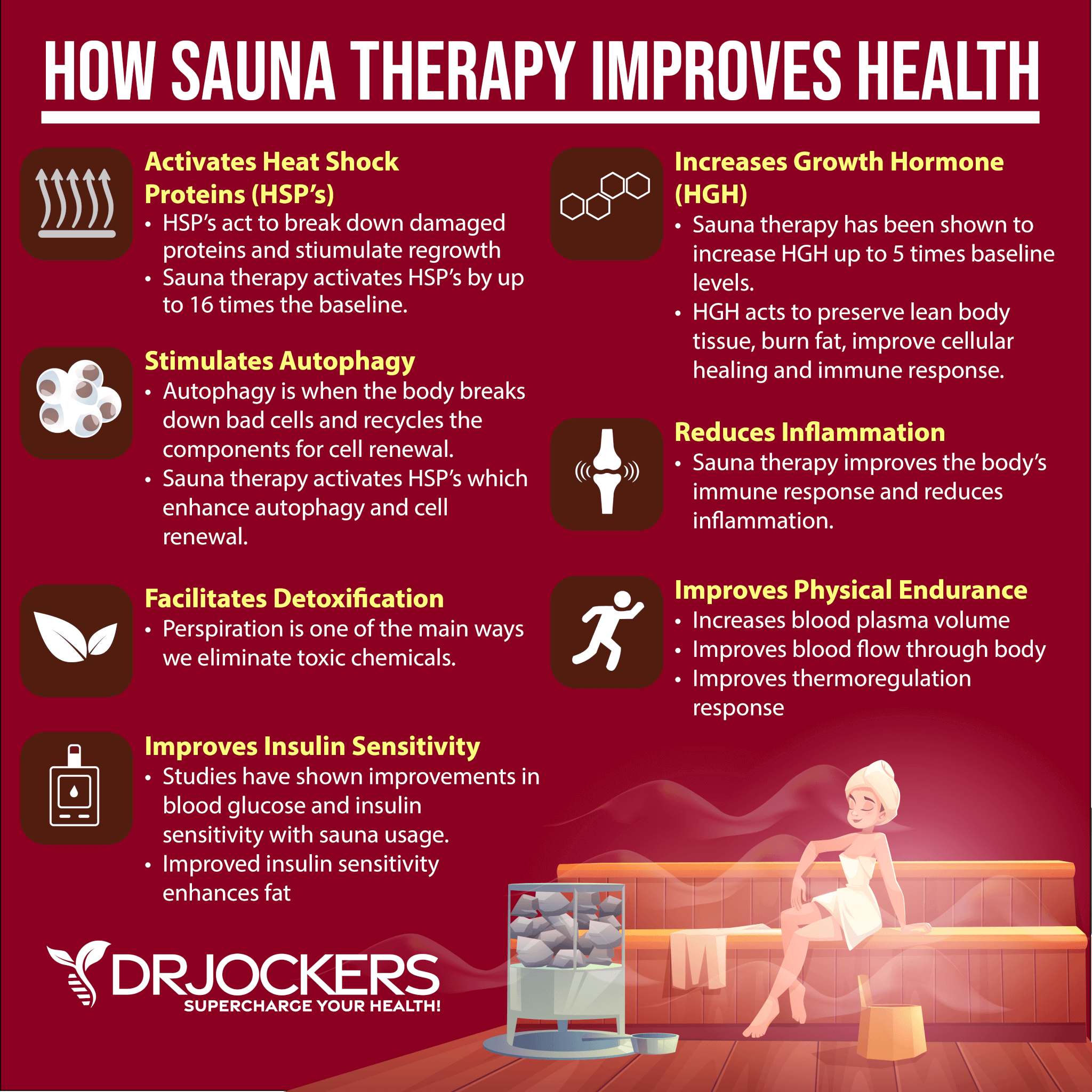
Eliminate Infections
Eliminating gut infections and biotoxin illness is an important step in improving leptin sensitivity, as these infections can increase your risks of leptin resistance. Make sure to eat an anti-inflammatory diet to support your gut microbiome (20, 21).
I also recommend a GI Map Stool Test to gain a greater understanding of your digestive health and help appropriate lifestyle changes for improved digestive health. To learn more about functional digestive health testing, I recommend this article.
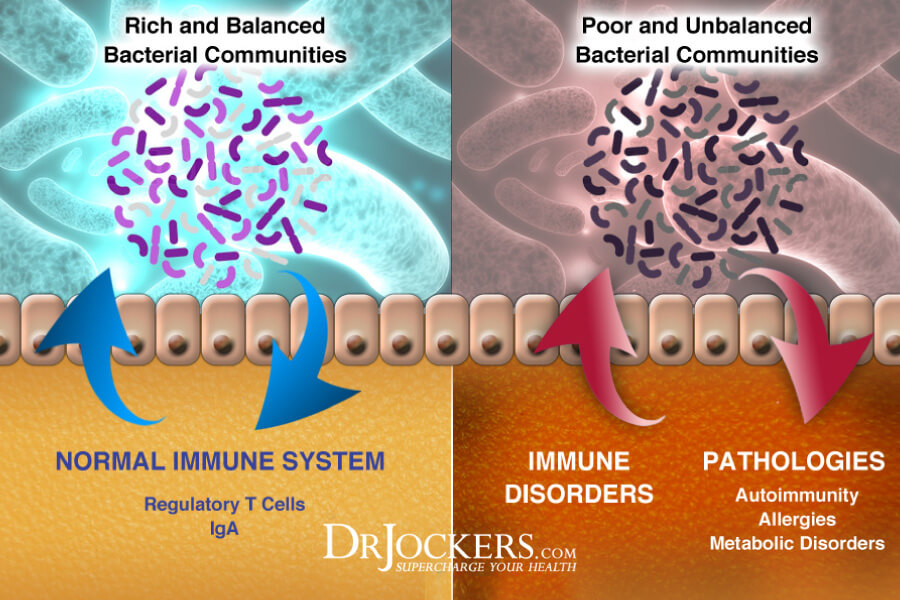
Strengthen the Gut Lining
As you’ve learned, leaky gut syndrome and gut health issues may contribute to leptin resistance. This means that taking care of your gut and strengthening your gut lining is absolutely critical (22, 23).
Make sure to follow a gut-friendly, anti-inflammatory, and nutrient dense-diet I’ve covered earlier in this article. Eat lots of prebiotic-rich foods and probiotic-rich foods. For additional gut health support, I recommend taking a daily probiotic supplement and using herbs like aloe vera, licorice root, marshmallow root, and nutrients like L-glutamine to support a healthy gut lining and aid recovery from leaky gut syndrome.
Top Supplements
In addition to these important lifestyle and dietary strategies, I recommend a variety of supplements to support leptin sensitivity and improve your health.
Magnesium
Magnesium is an important mineral that supports muscle relaxation, sleep, pain relief, blood sugar balance, insulin sensitivity, healthy circulation, normal blood pressure, and cellular energy. According to a 2010 study, magnesium deficiency may play a role in obesity, leptin resistance, and diabetes.
By supporting your sleep, your stress levels, and your mood, it supports leptin sensitivity. I recommend Brain Calm Magnesium daily. I recommend one scoop a day for optimal results (39).
Adaptogens
Adaptogens are known for their benefits on your hormonal health and stress levels. A 2012 randomized double-blind, placebo-controlled study demonstrated that ashwagandha can help to reduce stress and anxiety, which are both factors that can contribute to leptin resistance.
I recommend taking Cortisol Defense to support your health. It contains ashwagandha as well as magnolia officinalis bark, banaba leaf, and L-theanine. Take one capsule twice a day for optimal benefits (40).
Curcumin
Curcumin is the active compound of the spice turmeric. It holds incredible anti-inflammatory and anti-microbial benefits. A 2016 study found that an 8-week supplementation with curcumin helped to reduce adiponectin and leptin levels in patients with metabolic syndrome and a 2019 study has found the same benefits in those with non-alcoholic fatty liver disease.
I recommend Inflam Defense, which is a fantastic supplement powered not only with curcumin, but also resveratrol, quercetin, rutin, rosemary extract, ginger, and Boswellia extract to help lower your inflammation levels, reduce oxidative stress, support your circulation and lymphatic stress, improve immunity, and support your overall health. Take one capsule twice a day or for maximum results, two capsules twice a day (41, 42).
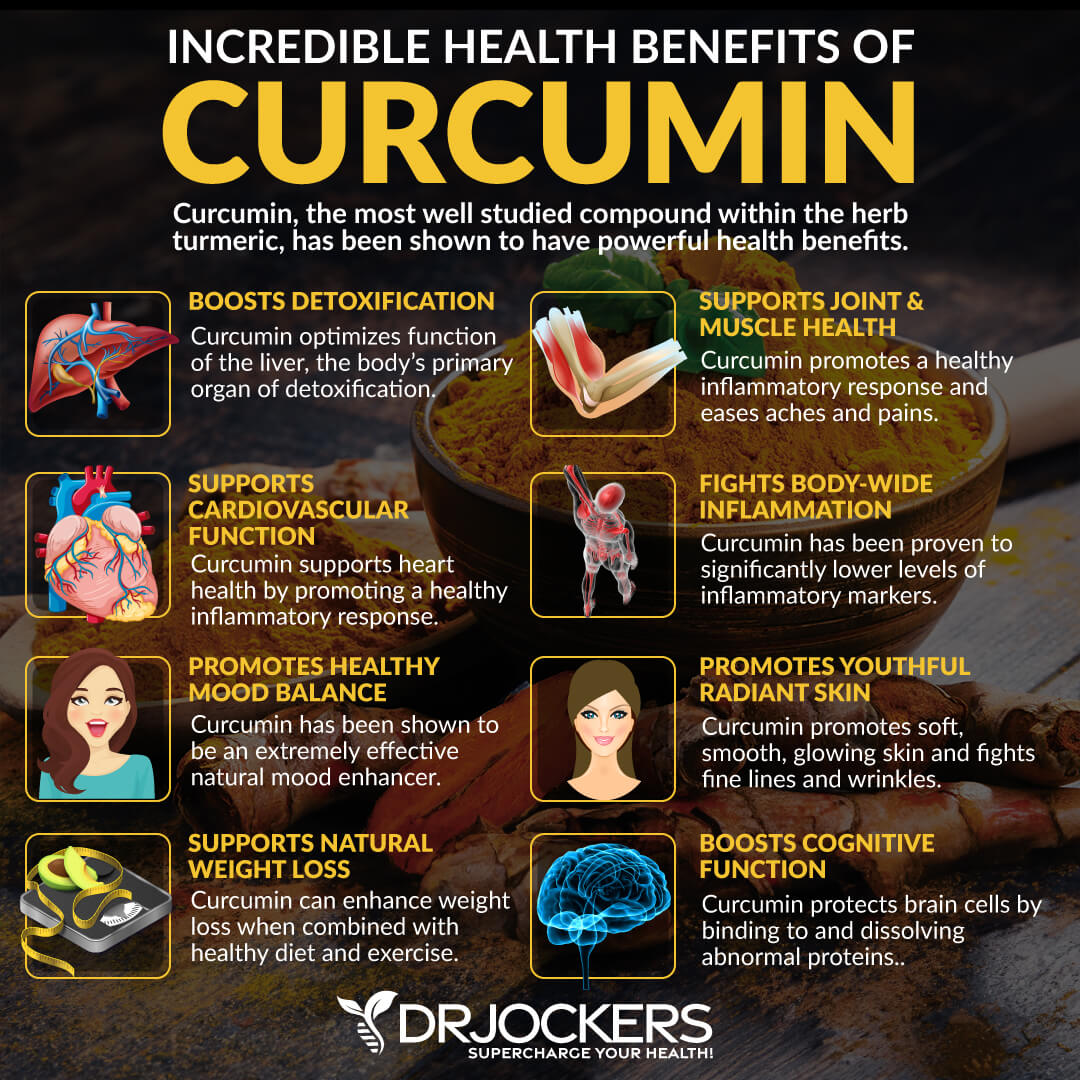
Resveratrol
Resveratrol is part of a group of polyphenols with antioxidant benefits on your body. According to a 2014 animal study, resveratrol helps to prevent leptin resistance, insulin resistance, body weight increase, visceral obesity, and hyperglycemia in rats. A 2019 study found that resveratrol may improve cellular response to leptin.
Another 2019 study on rats found that resveratrol helped to improve peripheral leptin resistance from a prenatal and postnatal high-fat diet through epigenetic regulation of the genes regulating leptin and its receptor. The study suggests that resveratrol may have a positive impact on obesity management and treatment.
I recommend Inflam Defense, a supplement supported by resveratrol, curcumin quercetin, rutin, rosemary extract, ginger, and Boswellia extract to help lower your inflammation levels and support your health. Take one capsule twice a day or for maximum results, two capsules twice a day (43, 44, 45).
Final Thoughts
Leptin is a hormone that helps your brain to regulate your appetite and eating habits. If you have leptin resistance, your brain is unable to recognize leptin signals leading to cravings, hunger after meals, weight gain, yo-yo dieting, insulin resistance, and obesity.
If you suspect that you have leptin resistance, I recommend that you follow my natural strategies for leptin sensitivity to help improve your health and wellness.
If you want to work with a functional health coach, I recommend this article with tips on how to find a great coach. Our website team offers long-distance functional health coaching programs. For further support with your brain health and other health goals, just reach out and our fantastic coaches are here to support your journey.
Inflammation Crushing Ebundle
The Inflammation Crushing Ebundle is designed to help you improve your brain, liver, immune system and discover the healing strategies, foods and recipes to burn fat, reduce inflammation and thrive in life!
As a doctor of natural medicine, I have spent the past 20 years studying the best healing strategies and worked with hundreds of coaching clients, helping them overcome chronic health conditions and optimize their overall health.
In our Inflammation Crushing Ebundle, I have put together my very best strategies to reduce inflammation and optimize your healing potential. Take a look at what you will get inside these valuable guides below!
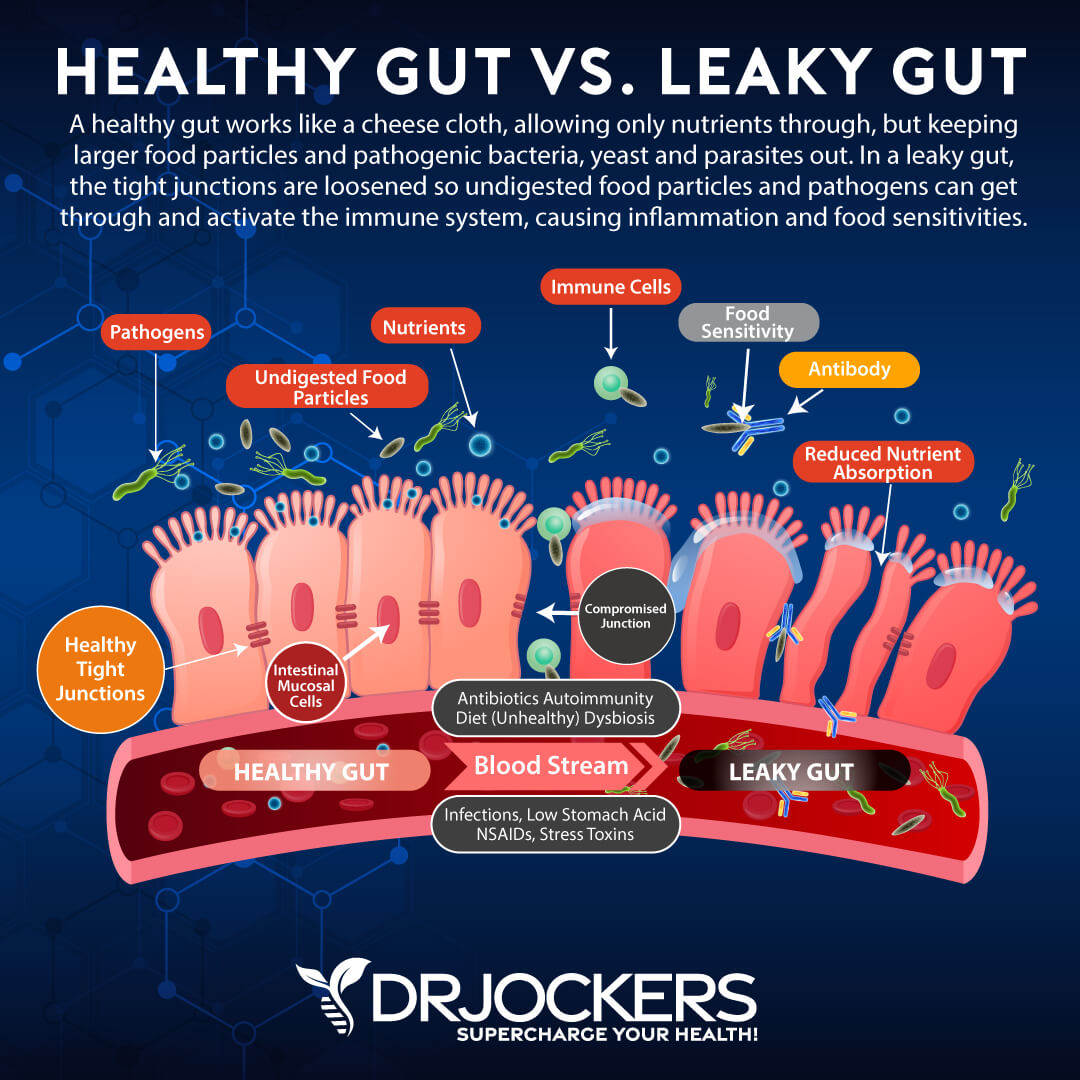


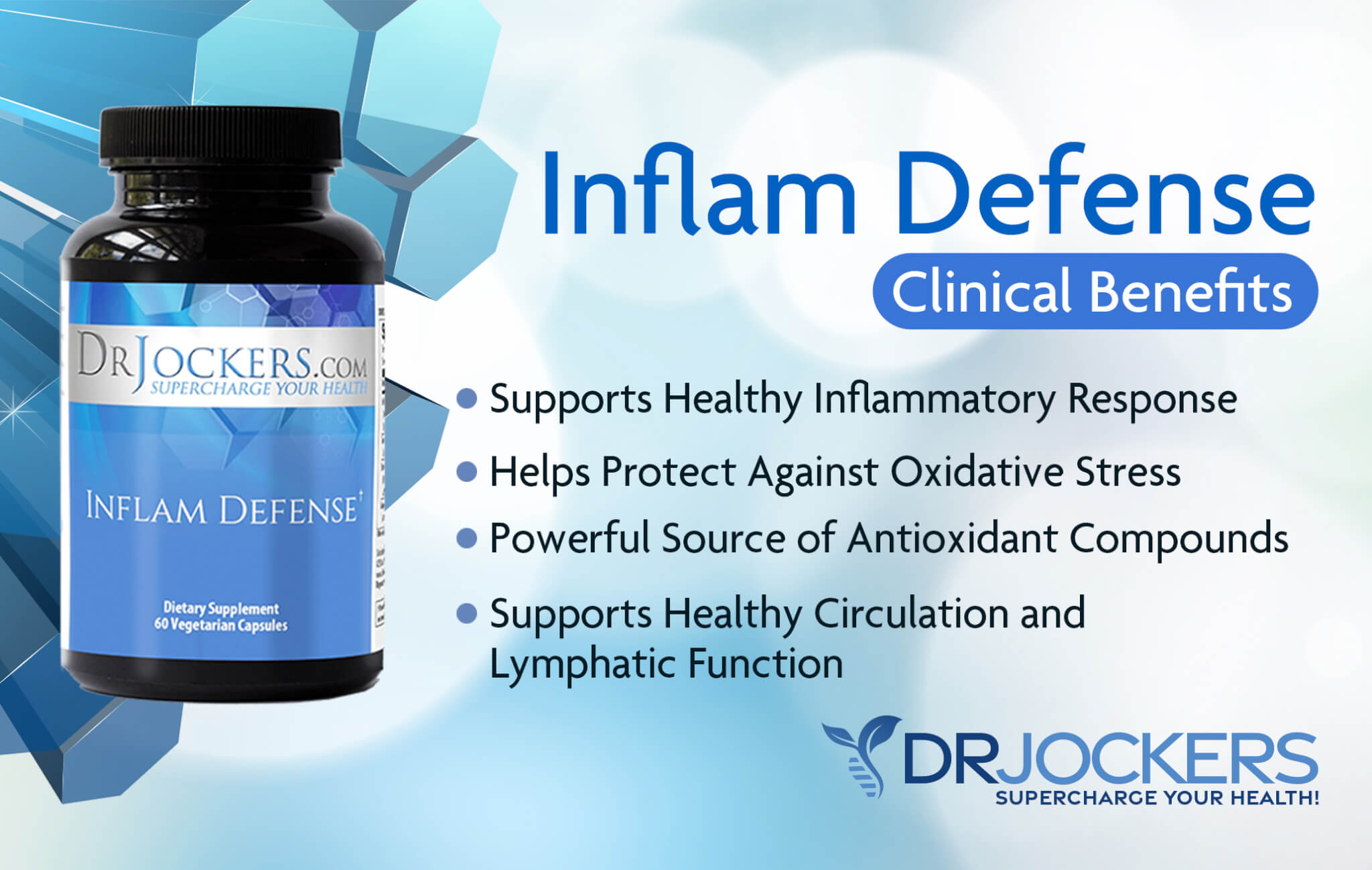




This the optimal level be listed as ng/mL?
Labcorp reports in ng/mL. Thanks for clarifying.
I wonder sometimes if there might be such a thing as leptin hypersensitivity. It’s a bit of a struggle for me to keep my BMI above 19. It’s not that I don’t have an appetite when I sit down to eat, and it’s not that my food, which I prepare myself out of whole natural ingredients, is not delicious. And I don’t have any unpleasant symptoms like indigestion or bloating. It’s just that by the time I’ve eaten half of the food on my plate my appetite is 100% gone and I have to discipline myself to keep on eating long after I would rather just call it quits and put the rest of my meal away as leftovers, which all too often I do even though I know really shouldn’t. Reminding myself to eat a small snack from time to time over the course of the day helps, but it doesn’t come naturally and I often forget to. And if I give myself anything short of a 12 hour eating window I’ll pretty consistently loose half a pound or more from one morning to the next.
I would be sure to do more strength training to build muscle, which will naturally increase your appetite.